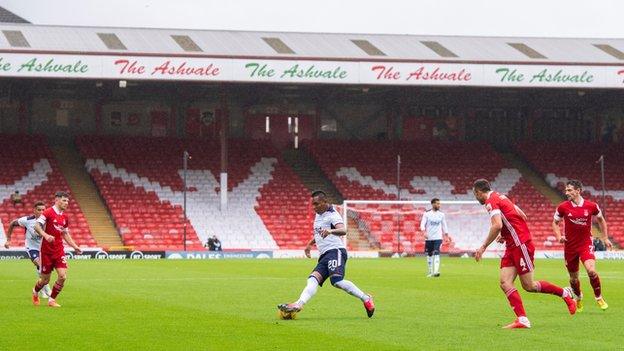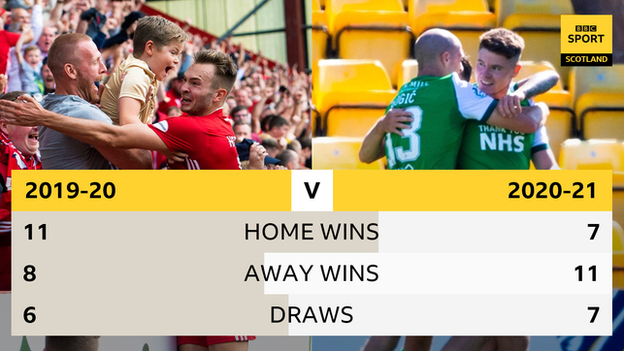Scottish Premiership: How has having no fans affected games?
- Published

Scottish Premiership football has been played behind closed doors since its resumption on 1 August
What difference has playing games behind closed doors made to the Scottish Premiership?
Has home advantage been diluted? Are goals rarer? Are referees less likely to brandish cards?
BBC Scotland looks at the opening few rounds of games and tries to draw some conclusions.
Fewer home comforts this term
With most of the division having played six games, the sample size is small.
But the early indications are that playing at home is not proving as beneficial as it did last term.
In the 33 games played so far in the top flight, the hosts have taken 43 points - or 1.30 per game.
That is significantly down on the average for the season that was curtailed in March, when 329 points were accumulated in 179 games, which shakes down as 1.84 points per game.
Given the composition of the fixtures can also affect that, how about we confine it to the opening 25 fixtures of each campaign?
Last year, 11 home wins were recorded in that time, compared to seven this August, four of which came on the opening weekend.

There has been quite a contrast across the opening 25 fixtures of both campaigns
Not as many goals or bookings
Fewer wins, then, and fewer goals for home sides, too. The 33 fixtures have yielded just 38 goals for the hosts, at an average of 1.15 per game.
That's down a significant chunk from last season, when the figure levelled out at 1.55 goals.
It isn't just the goalscoring charts that have seen a dip either.
Last month, Hamilton Academical head coach Brian Rice said referees have been more lenient without crowds to barrack them, and he might have a point.
Across the opening 25 games of both this season and last, yellow cards were down - from 89 last term to 76 this time round.
'There is less poor decision-making' - what they say
Hibernian head coach Jack Ross
"There is probably less poor decision-making from players because the emotion is taken out of it by crowds not being in the stadium.
"That makes games a little bit tighter because players will follow instructions a little bit better. With the crowd noise and adrenaline flowing, that can be an issue normally.
"It's easier for players to communicate with each other on the park and that goes back to teams being able to keep their shape."
Former Scotland striker James McFadden
"It's different, like when you play a practice match at the training ground there's not that same tempo. The crowd give you a lift if you are going through a tough time.
They cheer you on to give you that bit of energy. It makes a huge difference."